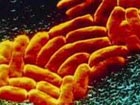| Videos | • Latest |
|
• Feature | • Sports | • Your Videos |
India objects to naming of superbug

India also has a thriving medical tourism industry. But health authorities there say there's an ulterior motive behind the move to name the superbug after the country's capital, New Delhi.
Many say what's in a name. But here's a case where everything is based on a name.
The World Health Organization announced that the swine flu pandemic may be over, but a new global threat is emerging. The threat comes from a bacterium called New Delhi Metallo-beta-lactamse-1, or NDM-1, pointing its origin from Indian capital New Delhi.
The controversy started with British investigators claiming that the bug originated from New Delhi. But Indian health authorities believe the western world is trying to rob its reputation in the health industry.
DR. V.N. Katoch, Director-General, Indian Council for Medical Research, said, "In the recent past, like when there was H1N1 from the west, then they don't tend to do that. People in our side of the developing world feel they are trying to malign us but, to me, objection is the interpretation and data, and saying that troubles have started here. It's without any substance."
Indian authorities say the hype is unwarranted. Research on antibiotic-resistant super bugs has been going on for years, and several strains have been identified all over the world. Indian health authorities say that a foreigner who came to India for surgery contracted the super bug is a matter of chance, and its unfair to create a scare perception about Indian hospitals. Indian citizens feel the same.
Montgomery, New Delhi Resident, said, "I am afraid this is a basic conspiracy, since it will directly hit medical tourism, because health tourism in every way is booming here. The infrastructure, our doctors, cost effectiveness is also there."
Jason, New Delhi Resident, said, "It's pretty rude to name a bug after a city. Its kind of offensive."
Even though authorities claim that this would impact medical tourism in the short run only, the fact is they are a worried lot.
And there is a good reason for that. In average South Indian city Chennai receives 600 patients a month. Mumbai and Delhi see an average of 300 people a month coming for treatments. Medical tourism in India became a reality in 2005, after awareness increased about India's medical scene among foreigners.
Cost effectiveness was also a major attraction, with treatment in India being 75 percent cheaper than United States. And as superbug starts to spread, India's health tourism worries will only mount.
"Indian authorities believe naming a bacteria originating out of South Asia after Indian capital New Delhi is an effort to malign India's booming health tourism industry. In fact, they say that this has always existed, and there is nothing new about it. But they do agree that this would impact the country's health tourism industry, even if in the short term. "
 0
0 







Go to Forum >>0 Comments